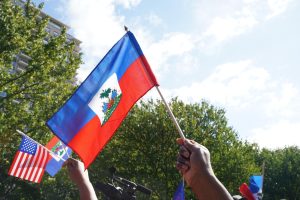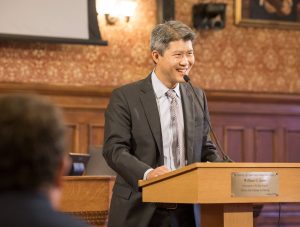Changemaker: Cheryl Buchanan on breaking through the margins in writing
“I feel like the more we allow people to be seen and heard, the more likely it is that we don’t have as much disconnect about real issues and can solve real problems.”
November 29, 2021
When Cheryl Buchanan was a lawyer defending victims of sexual assault at the hands of the Catholic Church, she would go home after long days of work and write. Although the only book she could read in those 10 years was Elie Wiesel’s “Night,” she would fill up countless journals with her stream of consciousness — all her thoughts and emotions assembled in words — just so that she could function. During this time in which her life revolved around such emotionally intense work, she started to realize the value of expressive writing.
Years later, after moving to the east coast and championing the therapeutic qualities of creative writing to local community organizations, Buchanan was able to do her first writing partnership with the St. Francis House. From there, Writers Without Margins was born.
Writers Without Margins is a non-profit that brings literature and writing to the underserved communities of Greater Boston. Through partnering with homeless shelters, prisons, and community health centers, Writers Without Margins provides writing workshops for those that suffer from issues such as drug addiction, mental illness, incarceration, abuse, and disability.
The Scope had a conversation with Buchanan, the founder and executive director of Writers Without Margins, about the ways writing and literature can nurture those who have experienced trauma, as well as writing workshops as spaces where people can tell their own stories in their own narrative voices.
What sets Writers Without Margins apart from more typical writing classes?
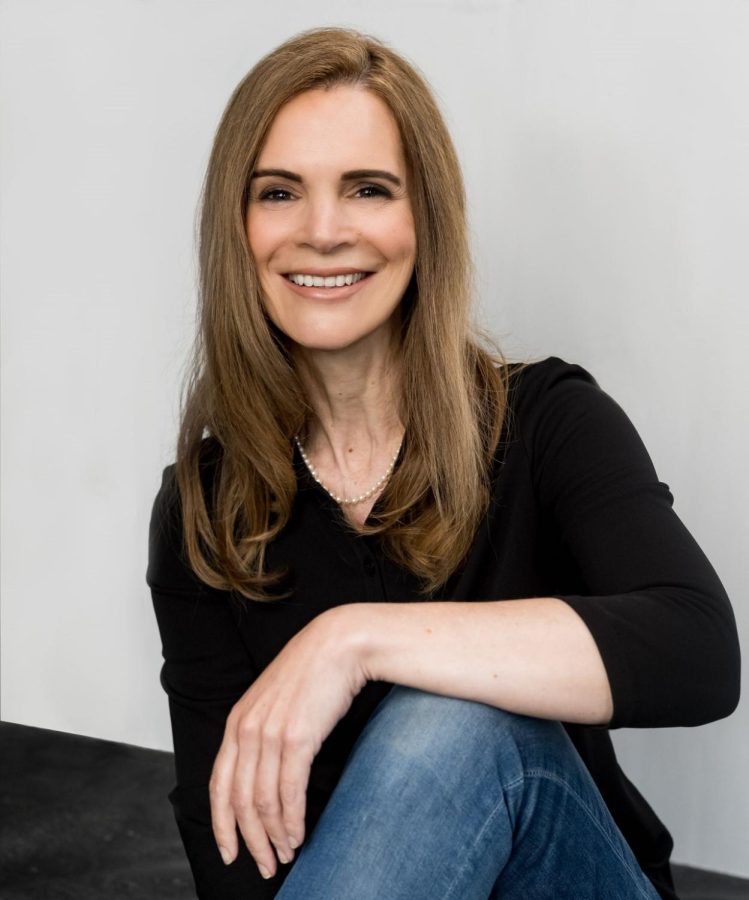
One thing that separates us from either academia or another writing residency or writing institution is that we purposely try and immerse ourselves in the populations that we work with and maintain a responsible distinction of who we are and who we are not. We are not therapists. Even though some of our facilitators are therapists, they are not therapists when they are in their role as facilitators. Although they and we are likely to practice some exercises that would be considered art therapy or therapeutic, that is a subtle but important distinction.
I also think this goes back to Pennebaker [Dr. James Pennebaker, a social psychologist that researched expressive writing]. It’s different than therapy in the sense that even when you and I are talking, there are so many social cues. Not everyone has them as much as others, but I will watch you to see if I think I’m saying the right thing, and I will redirect when I do and when I don’t. Writing is very different because you don’t have anyone guiding you. So, when you write, it’s like the purest form of honesty, and that’s why it is a different channeling of truth and self than any other form of communication. That’s what makes it a means of its own, release or catharsis or potentially therapeutic self-expression. Maybe even more than going to a therapist because the therapist is evaluating you. A friend who you don’t want to burden could also be hearing you, but differently. But that time with the notebook is different.
What do you think Writers Without Margins does for the participants? What kinds of participants do you usually interact with?
It’s a lot about agency, you know? Being given agency. I’ve resisted using the phrasing “giving them their voice” because they already have their voice, right? Of course, they have their voice. I think it’s more respectful and honest to say, ‘You’re not giving them their voice; you’re just passing the mic’ because there is a power structure that undeniably exists everywhere, anywhere. There’s always a power structure, or too often, there is an assumed power structure.
In our workshops, we are often stepping into a place, whether it’s a jail or a homeless shelter, where there’s such an obvious power structure in that environment. It doesn’t just exist because they’re in the homeless shelter or the jail. It’s really, really clear there, but nobody stepped into the homeless shelter or the jail, and, all of a sudden, their power was taken away. There was likely way too many situations that led up to that, between likely childhood trauma or assaults or a horrifying set of snowballing occurrences that led there.
So, to be in a situation where somebody makes a response to a writing prompt and the first thing they’ll say is, “well, I don’t think I did this right, but…” It’s so common. It’s just this freighted way that people are. Trying to please the authority figure. It’s so heavy in the interaction. So, if we can just get past that to the ‘there’s not a right or wrong in this.’ If we can get anyone to believe that what they’re saying actually matters … it’s huge.
Just to reckon with the instability that people have faced. The abandonment. The lack of stability that people have faced by the time they get where they are when we see them is really important to know. So, I look at somebody who’s in their 20s or 30s and have them say, ‘I don’t think this is right, but…,’ and I might be the first person to say, ‘I just want to hear what you say.’ Maybe in a long time. Maybe ever.
How have Writers Without Margins been affected by the COVID-19 pandemic?
We started doing online for the first time, which at first, I was like, ‘His isn’t what we do. We’ll do it, but it’s not what we do.’ It was an interesting adjustment. We started doing writing prompts, sending emails, creating those every week. We did 52 writing prompts and sent them out to anyone that wanted them. What happened was we reached people that we wouldn’t have otherwise reached because they weren’t even at organizations — people who probably weren’t doing much else. A lot of them weren’t leaving and didn’t have a lot of other access or interaction. So, I do think we achieved something that was beneficial for us, for them.
That also spoke to our mission because we were able to go into homes and have people, in another way, come out of homes and come out of places that they couldn’t otherwise during that time. We’ve continued, and now we’re starting to tentatively, more carefully, come back out. Last week, I spoke to the library about ways to bridge that gap and maintain some of this remote work, carefully do a little bit of both, and figure out how to maintain that connection.
We did go to the Suffolk County Jail during the pandemic masked. Interestingly, the sentenced population was no longer allowed visitors, so they were very safe for us. They had no exposure. We were probably less safe for them. So, it’s just that we had to continue to reassure folks that we were not bringing in exposures, and that was a really interesting experience. Mental health-wise, it was very hard for people who are already very cooped up to have nothing going on. I want us to get back there because they eventually did shut down. After all, there was an outbreak. So that was a really good experience for us.
How are your workshops usually structured? How does that structure work towards both the creative process and the healing process?
So, we have a little bit of a standard default that our workshop looks like, and then we do some collaborative things. So, a typical workshop would be bringing in an excerpt: prose, poetry, creative nonfiction, anything. And the participant, usually two, would read it aloud, and then the group would discuss it. What moves you? How do you feel about it? What do you think about it? What’s your favorite line and why? What do you think the author’s intent was in writing it? What do you think is going on here? These discussions are no different than the discussions that would have been taking place at a graduate school, a workshop that I would have attended.
Then, the discussion would move towards a prompt. The prompt would be anything from … well, I’ll give you a default prompt. A default prompt that is sort of a typical expressive writing prompt would be, “pick a line. Write from that line.” If we’re looking at Rilke’s poem, ‘Go to the Limits of Your Longing,’ and the line that I choose is, ‘Let everything happen to you: beauty and terror,’ that’s my line. That might be two lines, but I can choose to make it one. So, maybe I start with that line. And that’s the line that’s going to be my springboard. And so, in most of our groups, there are no computers. We give them composition notebooks that look like this (Cheryl lifts a black and white composition notebook sitting on her desk).
So, they would sit with their notebook, and they’d have anything from 10 to 20 minutes. And they’re going to write, or I’m going to write from ‘Let everything happen to you: beauty and terror. Just keep going. No feeling is final.’ That’s what he wrote. So, I write whatever I write. Then, when I get to the end of it, I may choose to keep that one or choose the original language. I might choose to throw it out. Maybe it’s in the beginning, maybe it’s in the middle, maybe it’s in the end, I don’t know. But what it did was it gave me material to begin my work, and from the discussion, it came from the original material it came from, from somewhere.
Maybe it came from decades or hundreds of years ago, or maybe it came from days ago, depending on who the original author or inspiration was. So, what we’re doing is we are conversing with, or in Vonnegut’s language, we are meditating with some other writer or thinker out there in the world. We are in community with somebody else who has been there before. And that’s an important part of our work. That in itself breaks isolation. That reminds us that someone else has experienced something that we can relate to. And we are not uniquely put here. And that we are able to be heard.
Then comes the sharing. Nobody is forced to share. Nobody is asked to share. Everybody is encouraged to share, so we try always to leave enough time or room to allow everybody to share. That’s sort of the point of the group in terms of that’s why it’s a group. There’s an ability for people to hear one another. If you had 10 minutes, 20 minutes and then 30 minutes, that’s the whole thing. That’s an hour right there. So, most of our groups, even though they’re called an hour, they’re going to go over, and we all do that.
And then that sharing time, this is where arts therapists don’t have a meeting of the minds. Some therapists do this that will say, ‘You don’t give feedback.” The work is just to be heard. The academic world will say, ‘You comment on the work. The work is to be evaluated and judged and improved upon.’ Your role in academia is to be taught, so I’d say we exist somewhere in between. We ask people what they want of us, and we are there to facilitate that. We are there to elicit it from the individual and then be a vehicle for what is asked of us.
So, we try to be very emotionally intelligent. With our participants, some people don’t follow the prompts at all. They are there to write about something that happened that morning. That’s fine. Somebody else is going to be writing, ‘this is what I think the author said,’ because that’s what’s on their mind, and that’s what they’re going to write about. Somebody else is going to write in their notebook, and you don’t know what they’re writing, and that’s fine, too. Yeah, and they’re not going to share. There are other people that have sat there and written an entire notebook and handed it to me and said, ‘Please read this. Don’t ever share it with anyone.’ And they have written the most necessary stories about what has happened to them in their lives that they needed to get from one part of their brain to the other part of their brain. And that’s what the writing workshop needed to be for them. That’s why I think what we’re doing works because each one of those people did what they needed to do.
And there’s always something good to say. Always. And even if it is just one word. If they say, ‘Experience everything, beauty and terror,’ and if the next thing they say is ‘Beauty, beauty, beauty, beauty, beauty, beauty, beauty,’ and that is their whole contribution, the response could be … I had a professor once who told me never to repeat a word unless the repetition speaks for itself. If I have one word that I hear all day long, why not have it be “beauty.” Instead of saying, ‘Really? That’s what you did for 20 minutes?’ There’s always something good to say. It’s an amazing thing when people support one another. That is the best thing that ever happens in our workshops.
Why Boston? Why do you think it’s important to nourish and heal local communities?
I often feel like it’s a real microcosm of anything larger to see what can happen in a smaller group. When we talk about the jails, shelters and community health centers … I say the greatest thing I have ever seen is when people support each other in those groups. It’s always inspiring to me to see people of different backgrounds, different races, different cultural identities, different ages, different experiences, a different challenge coming in that door and a different challenge coming out but certainly not with a lot of support or safeguard having the respect, humanity, and care towards one another and taking the time to listen to one another. I feel like, if and when it happens there, it’s just the most obvious reminder that it can happen anywhere.
I think that the stories that people are telling in our workshops were my reason and my goal for doing the documentary. I felt like there was a real disconnect between what I was hearing and seeing in the news media about the drug crisis, the opiate crisis, specifically. I felt like people were capable of telling their own stories. People were being dehumanized in not being able to tell their own stories. So, I feel like the more we allow people to be seen and heard, the more likely it is that we don’t have as much disconnect about real issues and can solve real problems. And that perhaps will even fund solutions appropriately for real problems. So, I think my incentive to bring more people with more realistic experience to the table and allow them to be heard is probably based on that.
Driving today, I was once again struck by the obvious geography of how this city is a series of neighborhoods strung together or separated by hospitals and community centers and school after school after school. We are known throughout the country for our extensive network of colleges and universities and a well-developed universe of healthcare and human services. To me, it has always seemed that there is great potential for people to be more unified if we could get beyond some of the labels and invisible walls we create. Our organization is based on overcoming some of these mind-made barriers and using the fusion of arts and advocacy for empathy, empowerment, and public education.


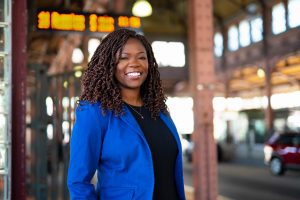


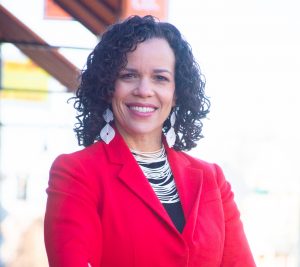
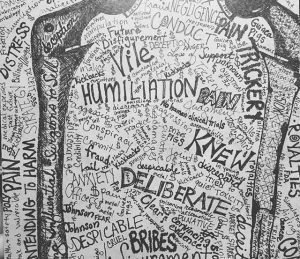
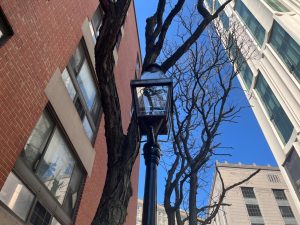
![Worcester, MA — Pearson’s recent piece “Lipstick on a Pig” contends with her self-perception. The title of the painting came to her first, “fixating in [her] head quite a lot,” Pearson said.](https://thescopeboston.org/wp-content/uploads/2024/03/2-300x200.jpg)
